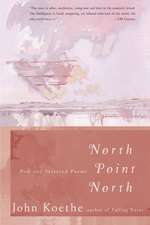June in Eden: OSU JOURNAL AWARD POETRY
Autor Rosalie Moffetten Limba Engleză Paperback – 31 dec 2016
Sometimes June in Eden occupies a garden in a wild landscape. Other times, we’re given a terrain where the coveted tree is one that hides a cell tower, where lungs are likened to ATMs and prayers are sent via text message. Rosalie Ruth Moffett’s debut collection of poetry, June in Eden, questions the human task of naming in a time where there are “new kinds of war that keep / changing the maps,” where little mistakes—preying or praying, for instance—are easily made. The heart of this book is an obsession with language, its slippages and power, what to do when faced with the loss of it. “Ruth,” says our speaker, is “a kind of compassion / nobody wants anymore—the surviving half / of the pair of words is ruthless.” There is, throughout this collection, a dark humor, but one that belies a tenderness or wonder, our human need to “love the world / we made and all its shadows.”
Rosalie Moffett’s June in Eden gives us a speaker bewildered by and in awe of the world: both the miracles and failures of technology, medicine, and imagination. These darkly humorous poems are works of grief and wonder and give us a landscape that looks, from some angles, like paradise.
Rosalie Moffett’s June in Eden gives us a speaker bewildered by and in awe of the world: both the miracles and failures of technology, medicine, and imagination. These darkly humorous poems are works of grief and wonder and give us a landscape that looks, from some angles, like paradise.
Preț: 96.37 lei
Nou
Puncte Express: 145
Preț estimativ în valută:
18.44€ • 19.18$ • 15.23£
18.44€ • 19.18$ • 15.23£
Carte disponibilă
Livrare economică 25 martie-08 aprilie
Preluare comenzi: 021 569.72.76
Specificații
ISBN-13: 9780814253847
ISBN-10: 0814253849
Pagini: 64
Dimensiuni: 152 x 229 x 10 mm
Greutate: 0.12 kg
Ediția:1
Editura: Ohio State University Press
Colecția Mad River Books
Seria OSU JOURNAL AWARD POETRY
ISBN-10: 0814253849
Pagini: 64
Dimensiuni: 152 x 229 x 10 mm
Greutate: 0.12 kg
Ediția:1
Editura: Ohio State University Press
Colecția Mad River Books
Seria OSU JOURNAL AWARD POETRY
Recenzii
“Such a disturbing and solacing book! ‘Hello, Robot,’ says a little boy in a grocery store to the shiny singing coffee grinder. These poems startle, charm, deepen. Rosalie Moffett makes it a point not to know it all, but, trust me, she knows plenty, taking prisoner after prisoner only to release them again to the outer space of wonder and selflessness, sanity and grief. She remembers: ‘Because Rosi, don’t you love / this Eden—its beetles, its blooms all waiting / to be named.’ These are poems we need in our age of terrible troubles.” —Marianne Boruch, author of Cadaver, Speak and Eventually One Dreams the Real Thing
“Aphasia: the impairment of the mind to comprehend language; literally, to be at a loss for words. Rosalie Moffett eloquently replaces the abstract language of clinical diagnosis with profoundly affecting descriptions of her mother’s deteriorating verbal grasp, ‘a city / at night with small, black power outages.’ Like a series of nesting dolls, these poems submerge us into the central core of mind and body, ‘the mercy of the interior’ where loss can be reconciled with love.” —D. A. Powell, author of Useless Landscape
“Rosalie Moffet’s tender and brilliant poems constitute a ‘fractal / of receptacles’ where we can more deeply perceive the strangeness of language, its many mirrors and doors, hazards and possibilities. Her wide-ranging knowledge—of anatomy, animals, botany, and much, much more—shapes her highly original imagination as she struggles to understand the ways we are ‘at the mercy of the interior.’ June in Eden offers a vision of how such struggle can transform our shared condition into something infinitely more lustrous and merciful.” —Mary Szybist, author of Incarnadine (winner of the 2013 National Book Award for Poetry)
Notă biografică
Rosalie Moffett has been published in Ploughshares, The Kenyon Review, and Tin House. She is the director of a high school writing center in Athens, Georgia.
Extras
Biology
I know metamorphosis turns
a kaleidoscope
into a caterpillar and then into a gypsy moth
with a white furry mouth. I’ve learned
some things. To mimic injury
the plover drags a wing
in the dust. The lure
of a wound is always enticing
away from something
smaller, more
vulnerable. Inside what looks
like a dress,
gauzy white silk, the tent
caterpillars
set to ruining
the tree.
This World, Its Weather
Not dawn, but the microwave
doing its mysterious molecule rattling
with a cup of coffee. The hum-comfort and glow—
up this early, I can’t help it if I see a dead ringer
for the sun there, next to the sink. For a time,
I was a twin. I waited in something I imagine
as a planetarium with the one who was
not me, who would disappear. This was before
my brain began to take
its automatic notes, so I felt nothing
that I know of when the partition went up
between us. I was assigned to this world, its weather
and oceans and dark 6am kitchens, my body
well-suited to transmit messages: how spring came all
of a sudden with its mania of crocuses, how it burnt
just now, the coffee pulled from its star. I fire
my circuitry, feel each thing
the way a fax machine would: brilliant
as it passes through. Somewhere, I have a sister
circuit, wired in mirror image. All night I understand
the data to be hers.
I know metamorphosis turns
a kaleidoscope
into a caterpillar and then into a gypsy moth
with a white furry mouth. I’ve learned
some things. To mimic injury
the plover drags a wing
in the dust. The lure
of a wound is always enticing
away from something
smaller, more
vulnerable. Inside what looks
like a dress,
gauzy white silk, the tent
caterpillars
set to ruining
the tree.
This World, Its Weather
Not dawn, but the microwave
doing its mysterious molecule rattling
with a cup of coffee. The hum-comfort and glow—
up this early, I can’t help it if I see a dead ringer
for the sun there, next to the sink. For a time,
I was a twin. I waited in something I imagine
as a planetarium with the one who was
not me, who would disappear. This was before
my brain began to take
its automatic notes, so I felt nothing
that I know of when the partition went up
between us. I was assigned to this world, its weather
and oceans and dark 6am kitchens, my body
well-suited to transmit messages: how spring came all
of a sudden with its mania of crocuses, how it burnt
just now, the coffee pulled from its star. I fire
my circuitry, feel each thing
the way a fax machine would: brilliant
as it passes through. Somewhere, I have a sister
circuit, wired in mirror image. All night I understand
the data to be hers.






















